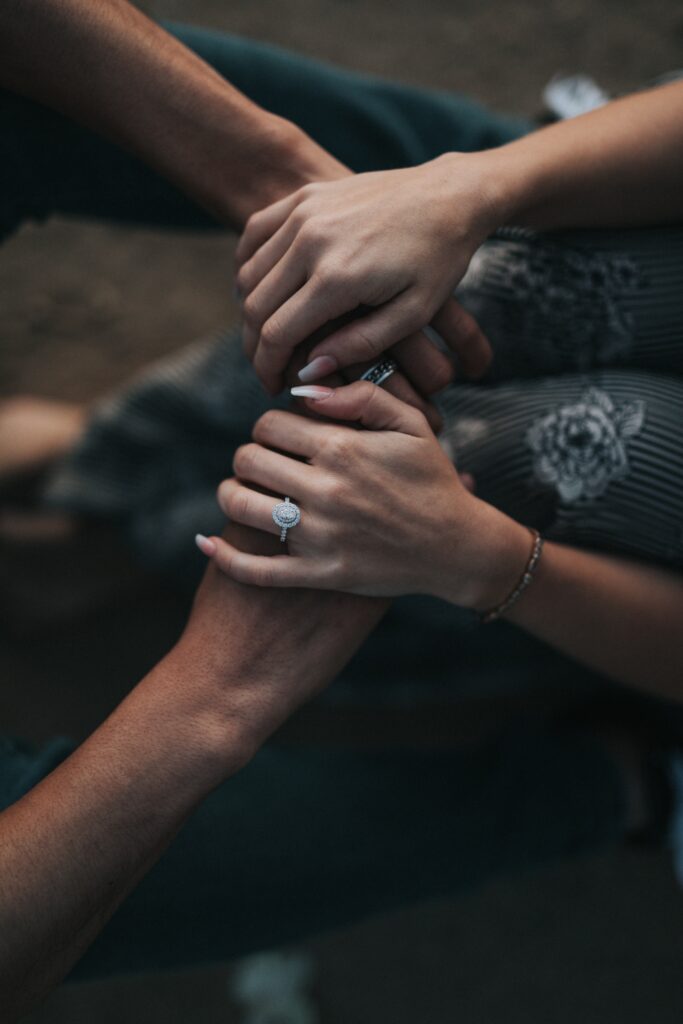
Are you ready to embark on a new chapter in your dating life? After a challenging experience or trauma, finding the courage to put yourself out there again can feel daunting. But fear not, for you are not alone in this journey. In this article, we will explore the complexities of approaching dating after a bad experience or trauma, providing you with valuable insights and strategies to help you navigate the path to love and happiness once again.
With a compassionate understanding of the emotional toll that such experiences can have, we will guide you towards healing and rebuilding your confidence. Together, we will delve into the intricacies of trust, communication, and self-care, equipping you with the knowledge to forge meaningful connections in a safe and supportive way. So, take a deep breath, summon your strength, and let us embark on this transformative exploration together, because your future is full of endless possibilities.

Learn How to Get Ready For your Date Right Here!
Seeking Emotional Support and Healing
Reach out to trusted friends and family
When you’ve had a bad experience or trauma related to dating, one of the first steps you can take is to reach out to your trusted friends and family for emotional support. They can provide a listening ear, offer words of wisdom, and be there for you during this challenging time. Having a support system in place can help you feel less alone and provide you with the comfort and encouragement you need.
Consider therapy or counseling
Another valuable resource you may want to consider is therapy or counseling. A professional therapist can help you navigate through the emotions and challenges that come with dating after a bad experience or trauma. They can provide you with tools and strategies to cope with your emotions, build resilience, and develop healthy relationship patterns. Therapy can be a safe space for you to explore your feelings and fears, and work towards healing and growth.
Engage in self-care activities
Taking care of yourself is essential as you embark on the journey of dating again. Engaging in self-care activities can help you relax, reduce stress, and boost your overall well-being. This can include activities such as practicing mindfulness or meditation, taking walks in nature, indulging in hobbies you enjoy, or treating yourself to a spa day. Self-care allows you to prioritize your own needs and recharge, which is crucial when you’re navigating the complexities of dating after a bad experience or trauma.
Reflecting on Past Experiences and Trauma
Allow yourself time to heal
Before diving back into the dating scene, it’s important to take the time and space you need to heal. Healing from past experiences and trauma requires patience and self-compassion. Allow yourself to feel your emotions and process them at your own pace. Remember that healing is not linear, and it’s okay to experience ups and downs along the way. Give yourself permission to take breaks and prioritize your well-being.
Acknowledge and process your emotions
Acknowledging and processing your emotions is a vital part of healing. Take the time to identify and understand the emotions that arise when you think about dating again. It’s normal to feel a range of emotions, including fear, anxiety, sadness, or even excitement. Allow yourself to feel these emotions without judgment and find healthy ways to express them. This might include journaling, talking to a therapist, or engaging in creative outlets.
Identify patterns and triggers
Reflecting on your past experiences and trauma can help you identify patterns and triggers that may have contributed to the negative experiences. Look for recurring themes or behaviors that you want to avoid in future relationships. By recognizing these patterns, you can better protect yourself and make conscious choices to break free from unhealthy dynamics. Identifying triggers can also help you develop coping strategies and establish boundaries to navigate potential challenging situations effectively.
Learn How to Get Ready For your Date Right Here!
Setting Boundaries and Prioritizing Self-Protection
Clearly communicate your needs and boundaries
Setting boundaries is an essential aspect of protecting yourself when entering the dating scene. Take the time to identify your needs and values, and communicate them clearly to potential partners. Establishing boundaries will ensure that your emotional and physical well-being is respected, and it will help you avoid situations that may trigger past trauma or negative experiences. Remember that it’s okay to say no or walk away from situations that don’t align with your values.
Take things at your own pace
After a bad experience or trauma, it’s crucial to approach dating at a pace that feels comfortable for you. Listen to your intuition and pay attention to how you feel in different situations. Trust yourself to know when you’re ready to take the next step or when you need more time. Remember that everyone’s journey is unique, and what works for others may not necessarily work for you. It’s okay to prioritize your well-being and move at a pace that feels right for you.
Trust your instincts and gut feeling
When it comes to dating, it’s important to trust your instincts and gut feeling. If something feels off or raises red flags, listen to your intuition. Your intuition is a powerful tool that can help guide you away from potentially harmful situations. Trusting yourself and your judgment will allow you to make choices that align with your well-being and protect you from repeating past negative experiences.
Getting Back into the Dating Scene
Start with casual social interactions
To ease yourself back into the dating scene, start by engaging in casual social interactions. This can include attending social events with friends, participating in group activities, or simply striking up conversations with new people. By starting slowly, you can gradually build your confidence and social skills, while also allowing yourself to get to know others without the pressure of intense romantic expectations.
Explore online dating platforms
Online dating platforms can be a convenient and accessible way to meet new people. Take the time to explore different platforms and find ones that align with your values and interests. Keep in mind that online dating may not be for everyone, and that’s okay. If it feels overwhelming or triggering, consider other alternatives to meet potential partners that might feel more comfortable for you.
Attend social events and join clubs or groups
Participating in social events or joining clubs and groups can provide you with opportunities to meet like-minded individuals who share similar interests. Whether it’s joining a book club, taking a cooking class, or participating in a volunteering activity, these settings allow for organic connections to form. Surrounding yourself with people who share common passions can foster a sense of community and facilitate meaningful connections.

Communicating and Building Trust
Open up about your past experiences when you are ready
When building a new relationship, it’s important to open up about your past experiences when you feel ready. Share your story with someone you trust, who has shown themselves to be supportive and understanding. Opening up can not only help you feel seen and heard, but it can also deepen the level of trust and understanding between you and your partner.
Practice active and empathetic listening
Communication is a key component of any healthy relationship. As you navigate the dating scene, practice active and empathetic listening. Pay attention to what your partner is saying, ask questions, and show genuine interest in their thoughts and feelings. Similarly, express yourself honestly and openly. Effective communication fosters understanding, builds trust, and lays the foundation for a healthy and supportive relationship.
Take it slow and build trust gradually
Building trust takes time, especially when you’ve experienced past trauma or negative dating experiences. Take it slow and allow trust to develop naturally. Give yourself and your partner the space to get to know each other at a pace that feels comfortable for both of you. By taking the time to build trust gradually, you can establish a solid foundation for a healthy and fulfilling relationship.
Recognizing Red Flags and Warning Signs
Pay attention to inconsistent behavior
When dating after a bad experience or trauma, it’s crucial to pay attention to inconsistent behavior. Notice if your partner’s words and actions align and whether there are any discrepancies. Inconsistent behavior can be an indication of someone who is not genuine or may not have your best interests at heart. Trust yourself to recognize these red flags and be willing to have open and honest conversations about any concerns you may have.
Trust your intuition if something feels off
Your intuition is a powerful tool in recognizing warning signs and protecting yourself. If something feels off in a relationship, don’t dismiss it. Take the time to listen to your instincts and explore your feelings. Trust yourself and your judgment. If you’re unsure, consider seeking advice from trusted friends, family, or a therapist. Remember, your well-being and safety should always be a priority.
Look out for signs of disrespect or manipulation
Respect and healthy communication are crucial in any relationship. Be attentive to signs of disrespect or manipulation, such as belittling comments, dismissive behavior, or attempting to control your actions. It’s important to set firm boundaries and speak up if you feel your needs are being disregarded or manipulated. Remember that you deserve to be treated with kindness and respect, and don’t settle for anything less.

Learning from Past Mistakes
Reflect on unhealthy patterns and behaviors
Taking the time to reflect on unhealthy patterns and behaviors from past experiences is an important step towards personal growth. Consider the role you played in previous relationships and identify any patterns or habits that may have contributed to negative outcomes. By recognizing these patterns, you can consciously work on breaking free from them and cultivating healthier relationship dynamics moving forward.
Recognize your own worth and value
After experiencing a bad dating experience or trauma, it’s crucial to remind yourself of your worth and value. Remember that your past experiences do not define you. You are deserving of love, respect, and happiness. Focus on building your self-esteem and self-confidence. Surround yourself with positive affirmations, engage in self-care activities, and practice self-compassion. Embracing your own worth and value will empower you to make choices that align with your well-being.
Learn to forgive yourself and let go of guilt
When reflecting on past mistakes or traumas, it’s important to practice self-forgiveness. Be kind to yourself and acknowledge that everyone makes mistakes. Holding onto guilt or blaming yourself for past experiences will only hinder your healing and growth. Allow yourself to let go of the past and embrace the opportunity for a fresh start. By forgiving yourself, you can make space for new possibilities and open yourself up to finding love again.
Taking Time for Self-Exploration and Growth
Discover your own interests and passions
Taking time for self-exploration allows you to rediscover and nurture your own interests and passions. Engage in activities that bring you joy and fulfillment, independent of romantic relationships. Explore new hobbies, pursue personal goals, and delve into self-improvement. By investing time in self-discovery, you not only grow as an individual but also bring a sense of wholeness and authenticity into your future relationships.
Focus on personal development and self-improvement
Personal development and self-improvement are lifelong journeys that contribute to your overall well-being. Take advantage of this time to focus on your growth and self-improvement. Engage in activities that promote self-reflection, such as journaling or therapy. Set goals for yourself and work towards achieving them. By prioritizing personal development, you build resilience and become more equipped to navigate future relationships with confidence and self-awareness.
Embrace the journey of self-discovery
Dating after a bad experience or trauma is an opportunity for self-discovery. Embrace the journey and allow yourself to explore new possibilities and meet different people. Take note of what resonates with you and what doesn’t. Pay attention to your emotions and how you feel in different situations. By embracing the process of self-discovery, you’ll gain a deeper understanding of yourself and what you truly desire in a healthy and fulfilling relationship.
Building a Supportive and Understanding Network
Surround yourself with positive and supportive individuals
Building a supportive network is essential when navigating the dating scene after a bad experience or trauma. Surround yourself with friends and family who uplift and encourage you. Seek out individuals who can provide guidance and understanding, and who genuinely want the best for you. Having a strong support system will help you navigate challenges, celebrate victories, and provide the reassurance you need as you embark on your dating journey.
Seek out communities or support groups for survivors
Communities or support groups for survivors of trauma can provide invaluable support and understanding. These groups offer a safe space to share experiences, gain insights, and connect with others who have been through similar challenges. Seek out local organizations or online communities that focus on healing and rebuilding after trauma. Connecting with individuals who have walked a similar path can provide a sense of validation and empowerment.
Consider joining therapy or support groups specifically for dating trauma survivors
Therapy or support groups specifically tailored for dating trauma survivors can provide specialized guidance and support. They offer a unique space for individuals who have experienced similar challenges to come together, share their stories, and learn from one another. Participating in therapy or support groups can provide you with additional resources, coping skills, and a stronger sense of community.
Embracing the Process of Starting Over
Embrace the opportunity for a fresh start
Approaching dating after a bad experience or trauma can be daunting, but it’s also an opportunity for a fresh start. Embrace the fact that you have grown and learned from past experiences, and allow yourself to be open to new possibilities. Remember that every new connection has its own unique potential, and the past does not have to define your future. By embracing the opportunity for a fresh start, you can approach dating with optimism and hope.
Be patient and kind to yourself
Patience and self-compassion are essential when starting over in the dating world. Understand that the healing process takes time, and finding the right person often requires patience and perseverance. Be kind to yourself throughout this journey, and celebrate the progress you make along the way. Remember that setbacks are a natural part of growth, and every step forward is a step towards finding the love and happiness you deserve.
Believe in the possibility of finding love again
Above all, believe in the possibility of finding love again. Despite past negative experiences or trauma, love is still attainable. Have faith in yourself and in the universe’s ability to bring positive relationships into your life. Trust that you have grown, learned, and are now equipped with the insights and tools to create a healthy and fulfilling romantic connection. By maintaining a positive mindset and believing in the possibility of love, you open yourself up to the joy and happiness that awaits you in the future.




